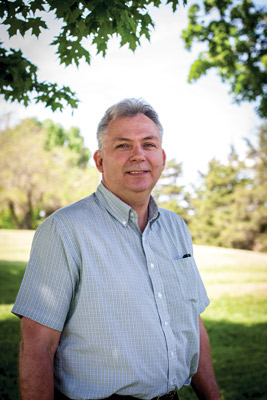
Within North American educational institutions affiliated with one of the three “historic peace churches” – Mennonite, Brethren and Quaker – only Eastern Mennonite University offers a graduate program pertaining to peace.
Which is why aspiring peacebuilders from other Christian denominations often make their way to EMU.
It’s why Jay Wittmeyer, now executive director of global mission and service for the Church of the Brethren, completed an MA at EMU’s Center for Justice and Peacebuilding in 2004.
At that time Wittmeyer was fresh from running a hospital in Nepal during its civil war, when that country’s version of revolutionary Maoists said they were struggling for justice and equity for those living impoverished in the countryside.
Interviewed at a gathering of STAR practitioners, Wittmeyer said the current situation in Nigeria reminds him of the dynamics of Nepal when he was there, off and on, from 2000 to 2004. Wittmeyer had recently returned to the United States after paying a supportive visit in April to Nigerian Brethren church leaders.
He said Boko Haram, a self-described Islamic group that is using violence and fear to try to turn Nigeria into its version of an Islamic state, is tapping the same grievances as the Maoists did in Nepal – meaning that Boko Haram feels that the oil money from Nigeria’s South is mainly going into the pockets of the Christian-dominated governing group.
The school in the far northeast of Nigeria from which Boko Haram kidnapped hundreds of girls on April 15 was founded by Brethren missionaries decades ago, but is now run by the government for girls of any faith, said Wittmeyer. Residents of the area in which the school is located, however, have been largely affiliated with the Church of the Brethren. He elaborated:
[Brethren] communities have been attacked and burned out. A lot of church members are staying with family members, cousins . . . we’re not seeing tent cities yet. Families are hosting others – they’ve built extensions on houses so they can house more. Some need to drill for more water, there’s so many more people.
But people can’t farm their lands – this is the time to plant. Hunger builds up through the months as you go. People get attacked at night and they just run. They literally have nothing. Do you migrate south? Do you try to stay? We are in conversation with Church World Service about help for refugees. A lot of Brethren families that have moved into Cameroon.
The recurring question is, ‘How can we help keep the Brethren Church to maintain its peace position in situations where members feel as though they are being led like sheep to the slaughter?
Wittmeyer feels the Nigerian Brethren are “teaching us about discipleship and taking seriously the words of Jesus. They are living them out in ways that we don’t typically have to do.” Notably, the theme of last year’s annual Brethren conference in Nigeria was, “They can kill the body but not the soul.”
While Wittmeyer necessarily stretches his attention to other responsibilities in Asia, Africa and all of the Americas, within Nigeria full-time is another 2004 master’s graduate from CJP, Toma Ragnjiya. He is the “peace officer” at the headquarters of the Church of the Brethren in Nigeria (known as EYN).
Ragnjiya has spearheaded the Christian and Muslim Peace Initiative and runs the peace-training part of the pastor training program. He is featured in an inspiring 18-minute documentary posed on YouTube with the title “Church of the Brethren in Nigeria Sowing Seeds of Peace.”
Much of Ragnjiya’s efforts go into building mutual support between Muslims and Christians, so together they can douse any sparks of violence between the groups and make space for moderates. In 2010-11 when a Muslim school was burned by Christian youths (who said they were retaliating for Muslim violence), Brethren leaders stepped forward, saying, “We recognize that Christians burning your school is wrong, and we want to make amends for that.”
They ended up providing a well to supply water to the rebuilt Islamic school. “That opened up doors for dialogue,” said Wittmeyer. “Out of that developed an interfaith peace program that is looking at micro-finance, with no interest owed. We’ve also been funding individuals to get trained across religious lines – we probably have 20 now, male and female. Maybe a Muslim does an internship or apprenticeship with a Christian welder, who could help them get started in their own business. We could do this with tailor shops.”
Wittmeyer sits on the board of Heifer International, which he would like to see add STAR-type trauma sensitivity training to its development work. — Bonnie Price Lofton
Another alumnus, Nigerian Gopar Tapkida, MA ’01, worked with support from Mennonite Central Committee for a dozen years in Nigeria, building bridges between Muslim and Christian communities and reducing the terrain for violence, before moving onto a new MCC assignment in Zimbabwe. Go to emu.edu/news and search for
“Nigerian grad has had huge impact.”